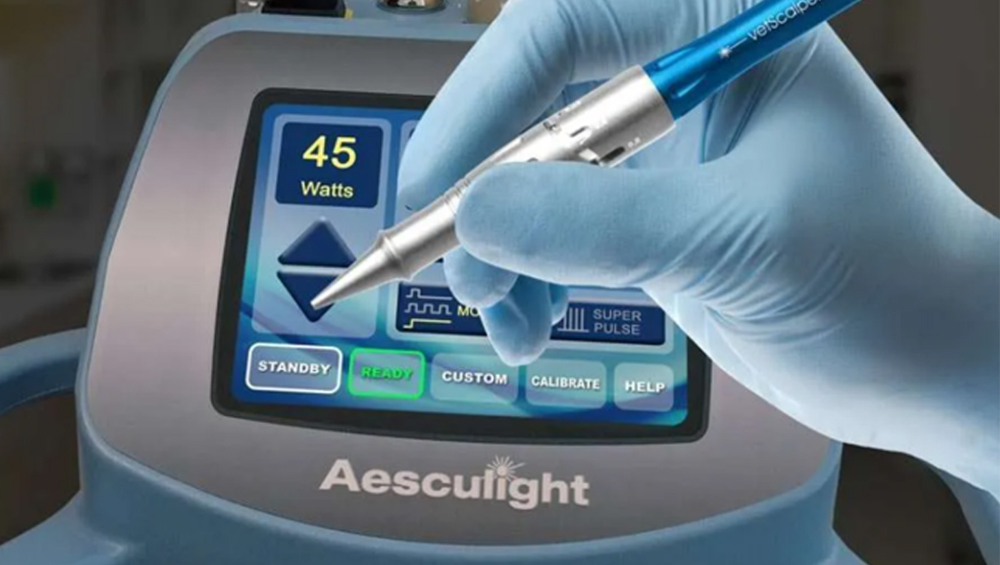Veterinary laser surgery represents a cutting-edge approach to surgical procedures and offers numerous benefits over traditional techniques. Dr. Man and the Boca Midtowne Animal Hospital team have used CO2 laser technology longer than most veterinarians and now have an upgraded high-power 45 watt surgical laser. Keep reading to learn about veterinary laser surgery and how your pet can benefit from this technology.
What is veterinary laser surgery?
LASER is an acronym that stands for “light amplification by stimulated emission of radiation.” The first lasers were used widely in human medicine in the 1980s, and the technology is becoming increasingly prevalent in the veterinary field. Veterinary lasers are used to perform routine elective surgeries as well as complicated procedures; the most common type of laser used is the CO2 laser.
How does a veterinary CO2 laser work?
The CO2 laser emits an invisible light beam that is absorbed by soft tissue and converted to heat. The energy is selectively absorbed by water molecules, which transfer the energy to adjacent tissue, resulting in an explosive vaporization event known as photothermal ablation. The CO2 laser can penetrate up to 0.1 millimeters into the target tissue, which means incisions are extremely precise, minimizing damage to surrounding tissues.
What are the benefits of a veterinary CO2 laser?
Veterinary CO2 lasers have many benefits over traditional surgical techniques, such as:
- Precision — Laser surgery allows veterinarians to precisely target tissues while minimizing damage to surrounding structures. That results in more accurate surgical outcomes and reduced risk of complications.
- Minimization of blood loss — The thermal energy created by the laser cauterizes blood vessels as it cuts, resulting in minimal bleeding during surgery and a clearer surgical field for the veterinarian.
- Decreased swelling and bruising — The laser’s precision minimizes tissue trauma and lymphatic vessel disruption, which means reduced swelling and bruising at the surgical site.
- Reduced pain — Laser surgery is associated with less tissue trauma, inflammation, and nerve stimulation compared to traditional surgical techniques, leading to reduced postoperative pain and discomfort for pets.
- Reduced infection risk — The CO2 laser beam’s sanitizing effect destroys pathogens, which minimizes the risk of infection.
- Faster healing — Laser surgery promotes faster wound healing by stimulating cellular repair processes, reducing infection risk, and minimizing scar formation.
What procedures are performed with a veterinary CO2 laser?
Veterinary CO2 lasers can be used in a wide range of surgical procedures, including:
- Spay and neuter procedures — Spay and neuter procedures can be performed faster and have a quicker recovery time with CO2 laser surgery.
- Tumor removal — CO2 lasers are often used to remove skin tumors as well as address sensitive areas such as the throat, nose, and lips.
- Oral surgery — A pet’s mouth can be difficult to access, but CO2 lasers help veterinarians precisely perform oral surgery.
- Eyelid surgery — Accuracy is key when performing eyelid surgery to help prevent damage to sensitive adjacent structures, and a CO2 laser is well-suited for these procedures.
- Tendon and ligament surgery — CO2 lasers can be used to address tendon and ligament injuries in a minimally invasive way.
- Brachycephalic Obstructive Airway Syndrome (BOAS) surgery — Brachycephalic (i.e., flat-faced) pets often have BOAS, which hinders their ability to breathe. BOAS surgery performed by CO2 laser can help these pets breathe better, improving their health and quality of life.
Who performs veterinary CO2 laser surgery?
CO2 lasers are becoming more widely used in veterinary medicine, but you want to ensure the veterinarian performing your pet’s laser surgery is well-trained and experienced in the technique to prevent complications. Dr. Man has numerous years of experience using CO2 laser surgery and often demonstrates appropriate techniques to other veterinarians.
If your pet needs surgery, contact our Boca Midtowne Animal Hospital team so we can determine if they can benefit from CO2 veterinary laser surgery.




Leave A Comment